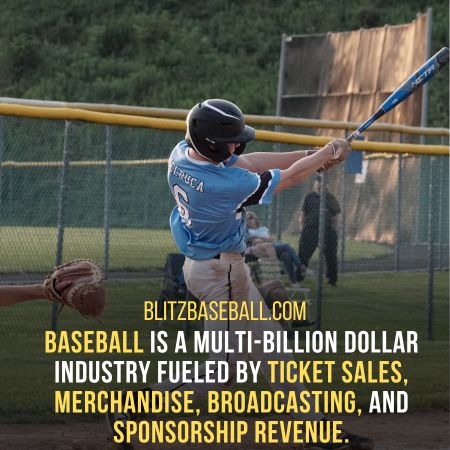Baseball players earn substantial salaries due to the intricate economic structure of the sport. Why do baseball players make so much money? Let’s see all the factors.
Baseball is a thriving industry, generating billions of dollars in revenue from diverse sources such as ticket sales, merchandise, broadcasting, and sponsorship.
The distribution of ticket sales revenue between home and visiting teams, along with merchandise demand influenced by team popularity and individual player appeal, contribute significantly to player salaries.
Moreover, endorsement deals and broadcasting rights fees further bolster players’ earnings.
By exploring the various revenue streams and factors impacting player compensation, this article delves into the economics behind the substantial incomes of baseball players.
Key Takeaways
- Baseball is a multi-billion dollar industry fueled by revenue from ticket sales, merchandise, broadcasting, and sponsorship.
- Player compensation in baseball is complex and varies based on performance, experience, and position, including performance-based bonuses and incentives.
- Factors such as ticket sales, merchandise demand, and endorsement deals contribute to a player’s salary, with teams with larger fan bases and newer stadiums generating higher revenue.
- Endorsement deals and broadcasting rights also play a significant role in player compensation, with players earning millions of dollars in addition to their salaries through these avenues.
Why Do Baseball Players Make So Much Money: Revenue Streams
The revenue streams in baseball, including ticket sales, merchandise, broadcasting rights, and sponsorship, contribute to the high salaries earned by baseball players.
Ticket sales generate millions of dollars each season, with revenue split between the home team and visiting team. The market size, team success, and player popularity influence ticket sales, with teams with larger fan bases and newer stadiums generating higher revenue.
Revenue from merchandise sales also contributes significantly to player salaries, as teams with larger fan bases and higher merchandise demand generate more revenue. Individual player popularity further influences merchandise sales.
Endorsement deals with companies that sell team merchandise can supplement player salaries, with players able to negotiate higher deals based on their performance, off-field image, and reputation.
Broadcasting rights fees, negotiated between the league and broadcasters, are also divided among the teams, with larger fan bases and teams located in larger markets potentially negotiating higher fees.
Player Compensation
Player compensation in baseball is determined by a complex structure that takes into account factors such as performance, experience, and position. The payment structure for players is not uniform and varies from player to player.
Performance-based bonuses and incentives are common, encouraging players to excel on the field.

Collective bargaining agreements play a significant role in negotiating the salary structure and benefits for players. These agreements ensure that players are fairly compensated based on their contributions to the team.
Additionally, endorsement deals can supplement player salaries, allowing them to earn millions of dollars in addition to their salaries. The popularity and marketability of players also play a role in determining their compensation. Players with higher popularity and off-field image may attract more endorsement deals, further increasing their income.
Overall, player compensation in baseball is a complex system that considers various factors to ensure fair and equitable payment for players.
Factors Affecting Revenue
Factors affecting revenue in the baseball industry include market size, team success, and player popularity. These factors all influence ticket sales. The size of a team’s fan base and the popularity of its players can significantly impact ticket sales.
Teams with larger fan bases and newer stadiums tend to generate higher revenue from ticket sales. Additionally, the success of a team on the field can attract more fans and increase ticket sales. Market size also plays a role, as teams located in larger markets may have a larger pool of potential fans to draw from.
Maximizing ticket sales is a crucial strategy for teams to compensate players better and generate more revenue. By focusing on factors such as market size, team success, and player popularity, teams can enhance their revenue streams and ultimately contribute to higher player compensation.
Endorsement Deals and Broadcasting Rights
Endorsement deals and broadcasting rights play a significant role in the revenue generation of the baseball industry.
-
Endorsement Deals:
-
Large companies seek to associate their brand with baseball and often approach teams or players for endorsement opportunities.
-
Endorsement deals can take various forms, such as product sponsorships and social media promotions.
-
The value of endorsement deals is influenced by player performance, off-field image, and reputation.
-
Players with a strong fan base and a positive public image are more likely to secure lucrative endorsement deals.
-
Companies may also offer higher endorsement deals to players who have a connection to their target market, such as endorsing team merchandise.
-
Broadcasting Rights:
-
Broadcasting rights fees are negotiated between the league and broadcasters.
-
These fees are then divided among the league teams.
-
Teams with larger fan bases and those located in larger markets may have more leverage to negotiate higher broadcasting rights fees.
-
Broadcasting rights provide a significant source of income for teams, contributing to player salaries and team revenue overall.
-
The popularity of the sport and the quality of the broadcast production also influence the value of broadcasting rights.

Frequently Asked Questions
How do baseball players negotiate their endorsement deals?
Baseball players negotiate their endorsement deals based on factors such as their performance, off-field image, and reputation. These deals can take various forms, including product sponsorship and social media promotions, and are influenced by both the player’s marketability and the company’s interest in associating with baseball.
Are there any salary caps or limits on player compensation in baseball?
Yes, there are salary caps and limits on player compensation in baseball. The Major League Baseball (MLB) has a luxury tax system and a competitive balance tax that imposes penalties on teams that exceed a certain threshold of player salaries.
How do collective bargaining agreements impact player salaries and benefits?
Collective bargaining agreements in baseball impact player salaries and benefits by negotiating the salary structure. These agreements outline the minimum salary, arbitration process, performance bonuses, and benefits, ensuring fairness and financial security for players.
What factors determine the amount of revenue generated from broadcasting rights?
Factors that determine the amount of revenue generated from broadcasting rights in baseball include league and team popularity, market size, and negotiation skills. Larger fan bases and teams in larger markets tend to secure higher fees for broadcasting rights.
How do teams with smaller fan bases or older stadiums compensate their players?
Teams with smaller fan bases or older stadiums may struggle to generate high revenue. They may compensate their players through performance-based bonuses, endorsement deals, and negotiating favorable collective bargaining agreements to ensure fair compensation for their athletes.

Conclusion
In conclusion, the complex economics of baseball contribute to the significant earnings of baseball players.
The multi-billion dollar industry relies on various revenue streams such as ticket sales, merchandise, broadcasting, and sponsorship. Factors such as team popularity, fan base size, and stadium quality affect revenue generation.
Additionally, endorsement deals and broadcasting rights fees further supplement player salaries. By maximizing revenue through these channels, baseball players are able to earn substantial amounts of money.
